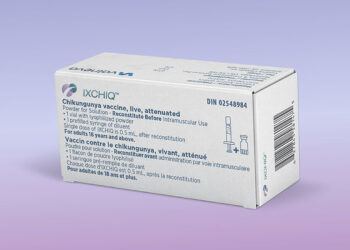TOPLINE:
Switching to oral antibiotic therapy after initial intravenous treatment matched the efficacy of exclusive intravenous treatment for infective endocarditis, with no increase seen in treatment failure rates and a median of 12 more days alive outside the hospital being gained by patients.
METHODOLOGY:
- Researchers in France conducted a retrospective cohort study including 333 patients with infective endocarditis (median age, 71 years; 70% men) to determine the efficacy of switching to oral antibiotics after an initial intravenous course vs exclusive intravenous therapy alone.
- Patients with at least 10 days of effective antibiotic therapy were assigned to either the exclusive intravenous group (n = 233) or the oral switch group (n = 100); the early switch to oral therapy was defined as transition within less than 10 days of starting effective intravenous treatment.
- The primary outcome was treatment failure within 90 days after completing antibiotic therapy, with treatment failure being defined as death, recurrence with the same bacteria, or the need for secondary suppressive antibiotic therapy.
- Secondary outcomes were the number of days alive and out of hospital during the 90-day period from treatment initiation and the occurrence of adverse events.
TAKEAWAY:
- Overall, treatment failure occurred in 17.1% of patients, and treatment failure-free survival rates were significantly better in the oral switch group than in the exclusive intravenous group (10.0% vs 20.2%; P = .021).
- No significant difference in treatment failure was observed between the oral switch therapy and exclusive intravenous treatment (hazard ratio, 0.55; 95% CI, 0.26-1.17).
- Patients in the oral switch group spent significantly more days alive outside the hospital than those in the exclusive intravenous group (median, 59.0 vs 47.0 days; P = .001).
- Rates of adverse events were similar in both the groups (P = .22).
IN PRACTICE:
“[The study] results further support oral switch therapy as a safe alternative to exclusive IV [intravenous] therapy, with potential benefits in reducing IV-related complications, as well as shortening the length of hospital stay, and its attendant costs,” the authors wrote.
SOURCE:
This study was led by Benoit Rallet, Dijon Bourgogne University Hospital, Dijon, France. It was published online on August 18, 2025, in Clinical Infectious Diseases.
LIMITATIONS:
The study’s retrospective nature introduced potential classification bias, particularly during follow-up and in adverse event assessment. The timing and duration of oral treatment were not standardised, and residual confounding could not be eliminated. The findings may not apply to subgroups such as patients with vascular prostheses or metastatic infections.
DISCLOSURES:
This study did not receive any funding. The authors reported having no conflicts of interest.
This article was created using several editorial tools, including AI, as part of the process. Human editors reviewed this content before publication.
Source link : https://www.medscape.com/viewarticle/early-switch-oral-antibiotics-effective-exclusive-2025a1000m3s?src=rss
Author :
Publish date : 2025-08-25 12:00:00
Copyright for syndicated content belongs to the linked Source.














